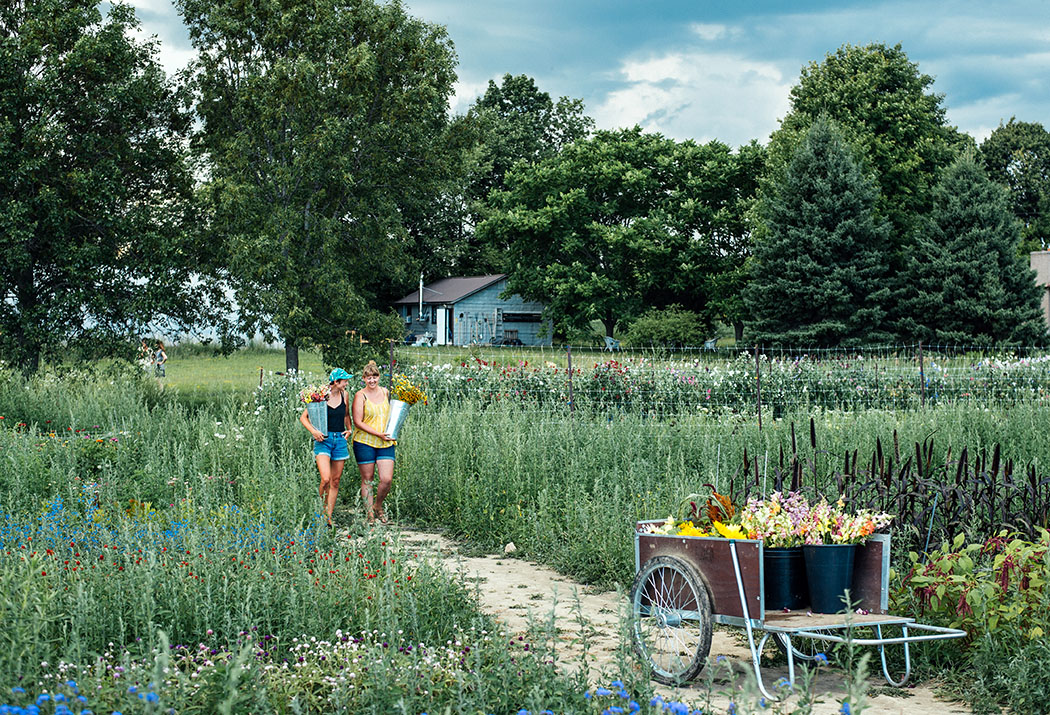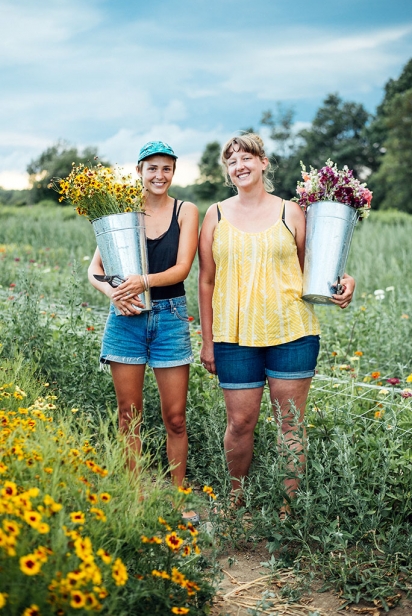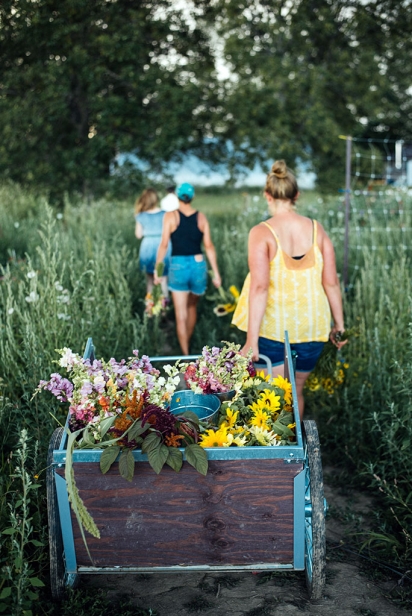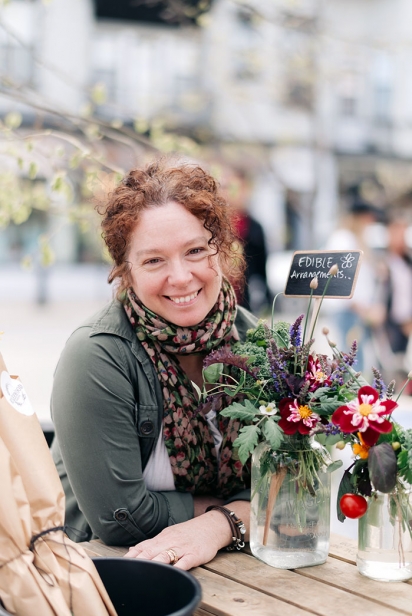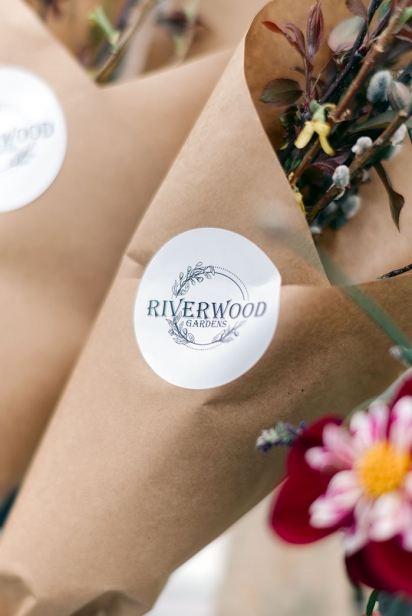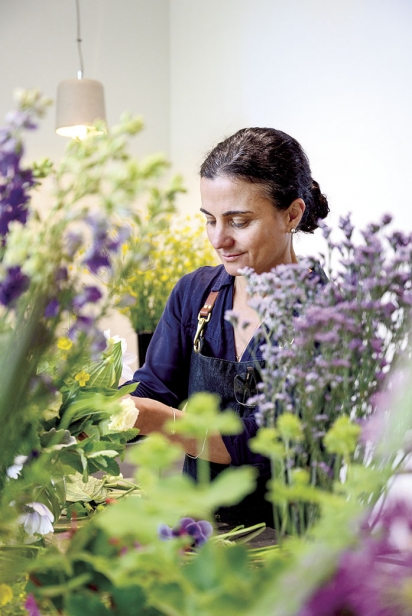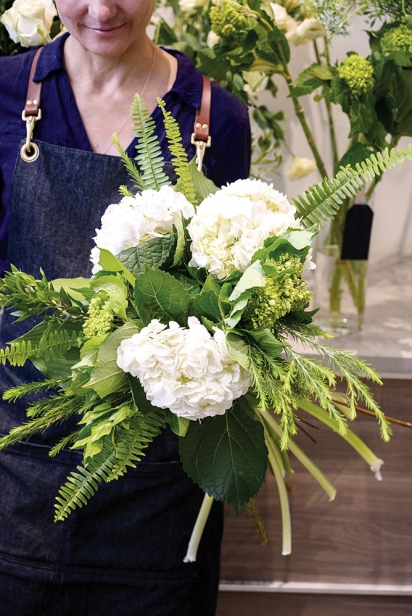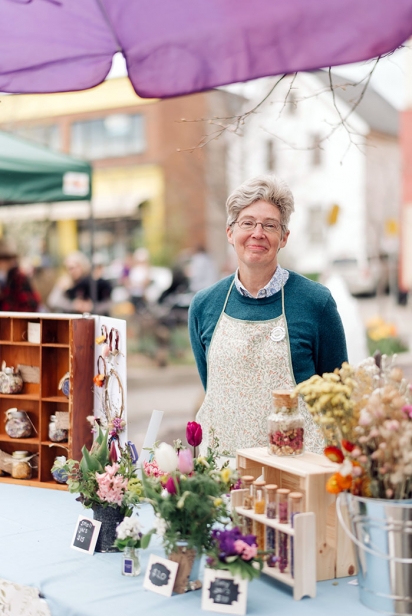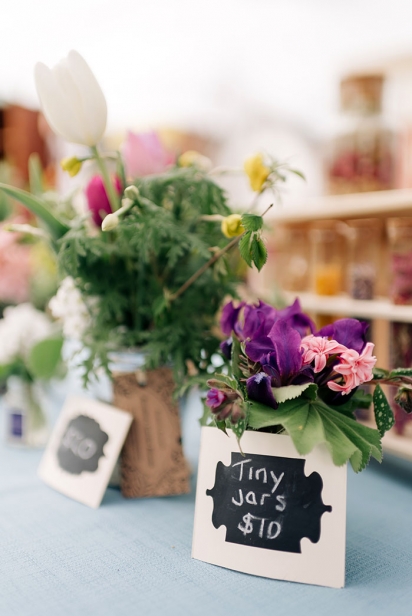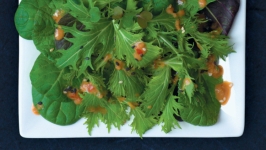Local Flora
Spring is a special time on a flower farm, as buds bloom and the results of plantings months ago when the snow still covered the ground are suddenly revealed. It’s a series of experiments with awfully long gestations. The gardener must wait patiently to see which ones were successful.
Sas Long, owner of Floralora Flowers, a design studio and flower farm in Prince Edward County, understands this process well. Over the past three years, she has tried unsuccessfully to grow ranunculus. Like a garden-themed Goldilocks with her proverbial porridge, those blooms were either too hot or too cold, resulting in an uninspiring crop. But finally, last year Long perfected her technique, and this season, she has managed to triple her crop by preparing them very early in the winter months. “At the end of January, I gave them the full month in the cooler and then planted them out at the end of February in the greenhouse,” she says.
As well as patience, the flower farmer needs a good dose of bravery. “It’s kind of scary, even in the greenhouse, to plant things at the end of February, when there’s tonnes of snow on the ground, but the ranunculus want those cold, cold days.” she says cheerfully.
Although Long is a member of many online communities of flower growers who share knowledge with each other, and has researched extensively on her own, she admits that it can be an inexact science. “In the end, it’s all trial and error, because it depends on your zone, it depends on your soil. It’s so specific to where you are. And that’s the best way to learn,” she says.
It’s an ongoing education that began back in 2011 when she went to volunteer on an organic vegetable farm in British Columbia. After returning to Ontario, she spent time at another farm and continued to research and learn about the business of growing. Now, six years after she started her own flower farm, she looks out over the rows of snapdragons, sweetpeas and lisianthus poking out of their earthy beds, and thinks of her mom, as she does every day. In fact, at Floralora, poignant reminders are all around.
Long was able to purchase the land and start her local floral business in Prince Edward County with the inheritance left to her by her mother. The flower farm was also named Floralora, in her mother’s memory. During a long car ride back from a floral workshop in Philadelphia, Long remembered how her mom would sing the lullaby Toora, Loora, Loora every night and the resulting word play stuck.
“The business kind of grew out of the grieving period of losing my mom. I was able to do it because of her and I wanted to memorialize her in a way in the name,” she says.
Most of Long’s business is now in providing floral wedding design services and helping brides to create beautiful arrangements using local blooms. In an average year, she works with up to 40 couples producing seasonally inspired floral designs. Much of that work includes educating the public about what flowers are in season and available within the Ontario region. “We’re trying to encourage customers to appreciate what’s in season at the moment. If somebody is getting married in September and they want peonies I will try and suggest they use dahlias or an equally gorgeous flower that’s in season at the time,” she says.
Growing her own flowers allows Long to provide a truly bespoke service to her clients, where they can even request particular flowers be custom grown for their wedding. “Part of the experience that we’re offering starts with talking to brides in the winter or even the year before. They come and visit the farm in the spring to see the seedlings that are going to be the flowers for their wedding,” she says.
It’s a world away from having foreign flowers flown in or spray-painted for an event. “Our flowers are inspired by our garden, right outside our door. We’re going out there and cutting them and bringing them right into the workshop and arranging them. They’re super fresh and last longer, because of the turnaround time between when we’re actually harvesting them, and when we’re bringing them to clients,” she says.
Encouraging people to use flowers that are naturally available at the time of their event is just one of the benefits of growing your own supply of flowers as a florist. Another is the sheer breadth of variety that Floralora can offer. “I have a lot of people who say, ‘I hate roses, I don’t want roses,’ but then I show them a David Austin garden rose that we grow, and they love them. We try and grow more unusual varieties that you can’t normally find in a wholesaler or a run-of-the-mill flower shop,” she says.
The farm covers three acres in total, home to annuals, perennials and flowering shrubs. Three unheated greenhouses offer a more controlled growing environment. Buying locally grown flowers and plants often results in a better product and is kinder to the environment. Long works hard to make sure her business is sustainable, using only natural fertilizers, such as fish emulsion, and biological pest control. “We don’t spray our flowers with anything. They’re totally naturally grown,” she says.
The trend for local flower farms continues to grow as the public becomes more interested in eco-friendly and resource-efficient businesses. Florists traditionally have been known as wasteful, Amber Tiede, owner of Riverwood Gardens, explains. “The cycle in the floral industry is just use it and trash it in 24 hours.
So much waste, so much expense.” In contrast, when she creates large installations for weddings and events, she prefers to use flowering plants and encourages her clients to give them away as favours to guests or drop them off at local retirement homes for longer use. That sustainable approach includes thinking mindfully about the materials she uses. “A lot of our customers know that we recycle, so they’ll save the containers from their orders and then they bring them back and we re-use them. We also try not to use any floral foam, because it doesn’t recycle or compost and it takes 100 years to go back to the earth,” she says.
Although Riverwood Gardens is a relatively new family business for Tiede, her husband Ed, and their children, who relocated and launched their flower farm three and a half years ago, Tiede has always been inspired by nature. She recalls how a gift she received as a child ignited this passion. “My mom got me a box of supplies from our local floral shop when I was 10 years old. It was a big rose box with a bow and it had wire and tape and clippers inside,” she says. The eldest of 12 children, Tiede had her own rose bush to tend to as a child and says gardening is in her DNA. All her siblings work in some way with the land.
“Everyone in my family grows things, and gardens — we all have our hands in dirt,” she laughs. Her education continued when she travelled to London as a young woman and was tutored under famed floral designer Jane Packer, who was responsible for royal arrangements, including the wedding flowers for Prince Andrew and Sarah Ferguson.
Riverwood Gardens provides locally grown flowers for at least 35 weddings a year as well as supplying corporate clients and businesses with arrangements and installations. One of its most popular items is edible bouquets, which feature herbs, edible flowers and even vegetables. “You can give them as a hostess gift or take them to the cottage on the weekend. Beautiful heirloom tomatoes, basil, lemongrass, thyme, rosemary, some perennial pansies and nasturtiums and things that you could add to your salads, so it’s gorgeous, and it’s also edible,” she says.
For Tiede, this family move has been more than just starting a new business — it’s been a major life change that has also enabled her to build a community. Friends and family help at the flower farm, and through her flowers she is hoping to spread a message of appreciation for the natural world. “We’re trying to encourage people to look around and see how much nature is there. You can take a plate and gather some stones, moss, branches and some flowers on a walk with your kid even if you live in a condo in downtown Ottawa — there is nature everywhere. And it’s there for us to use and admire its beauty,” she says.
Floralora and Riverwood Gardens are not the only local regional flower farms growing their own blooms. Bloomfields Flowers, which Virginia Vince started in 1998, has been offering locally grown flowers for a decade. Her husband, James, joined the business in 2005 and now the family flower farm, located in Prince Edward County, provides two shipments of fresh blooms a week to their Ottawa Glebe and Wellington West stores.
The couple enjoys providing a complete flower service to locals. “We love being able to design and deliver florals from seed to shop for our customers. We can cut back on our use of commercial flowers and avoid all the transportation and chemical costs associated with these crops,” Virginia says.
Customers visiting their stores have been impressed by the locally grown flowers, which can also be enjoyed through a subscription service. The three-and-a-half acres on the homestead in Prince Edward County is not intensively farmed and James describes it as a “magical garden, with blooms and accents at every turn.” The original stone building was built in the 1800s and now a staff of three, including master gardener Wendy Vince, presides over the flower fields. Grown without pesticides, the farm provides the capital city’s two stores with tulips, daffodils, hyacinth, peonies and many more.
Local flower farms produce a sustainable and environmentally friendly crop and bolster community pride and spirit. But one of the aspects of enjoying naturally grown flowers customers appreciate most is that every flower is different. They are not a perfectly packaged and polished product, but a naturally beautiful living decoration.
Floralora Flowers
438 County Rd. 24, Milford, Ont.
floraloraflowers.com, 613.885.2647
Riverwood Gardens
5647 Dalmeny Rd., Osgoode, Ont.
riverwoodgardens.ca, 613.869.5477
Bloomfields Flowers
783 Bank St., and 1280 Wellington St., W., Ottawa, Ont.
bloomfields.ca, 855.613.643
Ottawa Flower Market
Six local flower growers are showcasing their finest blooms at the Ottawa Flower Market this summer. Modelled on a similar concept from the Toronto Flower market, these recurring events will give local growers a chance to meet with the public and sell their flowers.
Rosalind Bennett, owner of Rosalind’s Garden Blooms and organizer of the Ottawa Flower Market, has always been a gardener. Originally from the county of Kent in England, known as England’s garden, she will be supplying a range of charming flowers from her residential garden, arranged in jars — that is, if she can keep the peckish rabbits away from her flowerbeds. “They seem to like what I have on offer and come from every garden around to feast on my lovely selection,” she says with a laugh.
The market is a mission Bennett feels is valuable to the local community and the aims of all involved. “We want to promote local flowers and let people know that they can purchase fresh, seasonal, sustainable flowers, grown without chemicals. Our mission really is to educate the public and promote the availability of local flowers,” she says.
Enjoy the flower market at Somerset Square Park in Hintonburg from 10 a.m. to 2 p.m., July 20, Aug. 17, Sept. 21 and Oct. 12. ottawaflowermarket.ca
The flower farmers exhibiting their blooms at the Ottawa Flower Market include Riverwood Gardens and Rosalind’s Garden Blooms, along with these other local growers based in and around Ottawa and as far afield as Perth, and Wakefield, Que.
Roam Flora
This flower farm located within Ottawa city limits, has outgrown its space since launching in 2017. From catering to weddings and private events, it's also known for creative and artistic installations.
Franktown House
This micro farm grows more than 100 varieties of flowers in its peaceful Wakefield, Que., location. It cultivates ecologically grown saffron and edible flowers, too.
Sylvia’s 4th Line Florals
Based in Perth, Sylvia's Florals launched in 1995 as a favour to a friend when she supplied some garden blooms for a wedding. She now has a team of gardeners working more than three acres of flowers and plants.
Ganden Gardens
Ganden Gardens is a family-run flower farm in Winchester, Ont. A 25-acre farm, two of which have now been allocated to growing local fresh-cut flowers.


